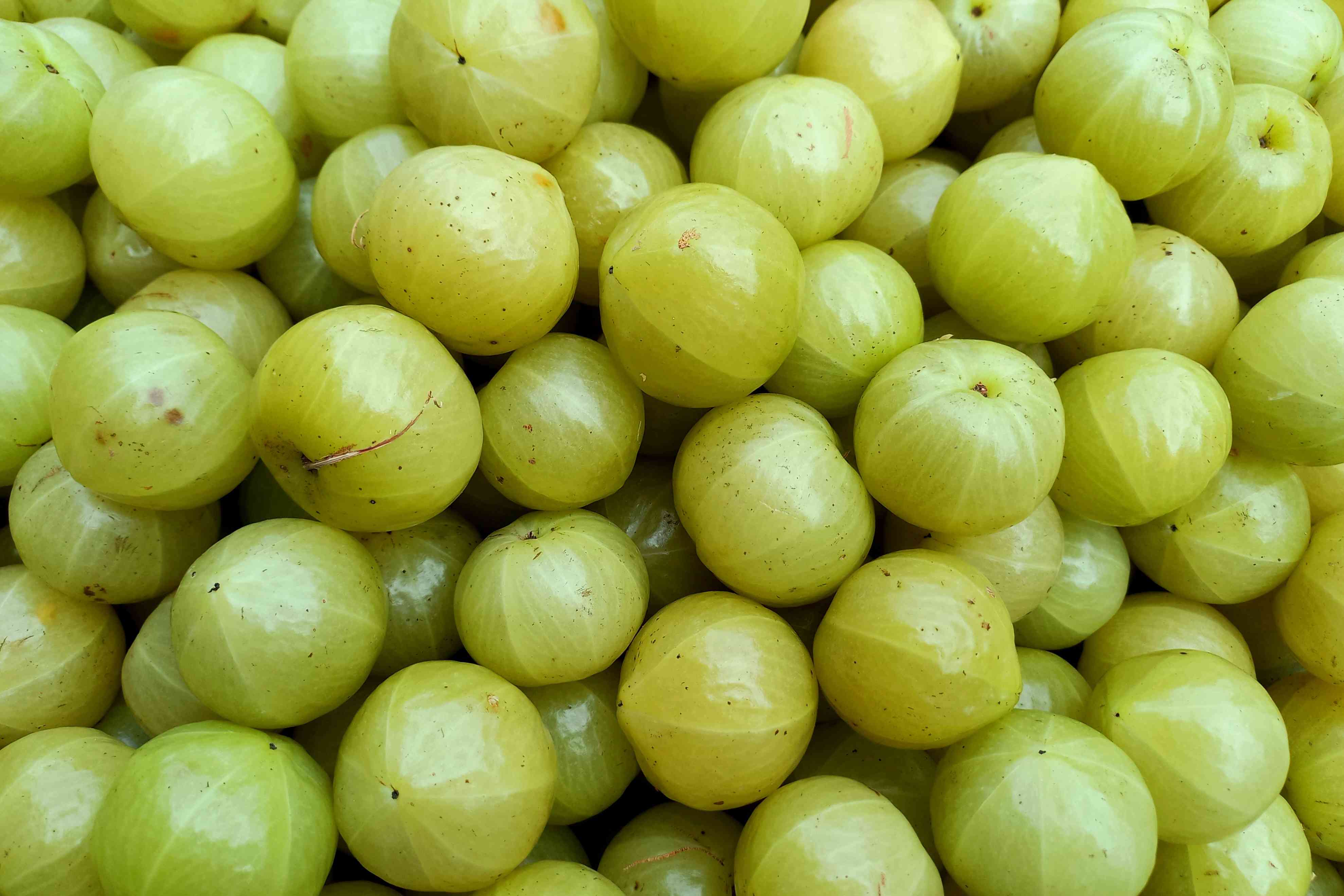
5 HEALTH BENEFITS OF AMLA
Medically reviewed by Simone Harounian, MSMedically reviewed by Simone Harounian, MS
Amla, also known as Indian gooseberry (Phyllanthus emblica), is a fruit tree native to India and Southeast Asia. The berries from the tree have been used in traditional medicine to support digestive health, improve immunity, and manage blood sugar levels.
This round, yellow-green fruit has a sour and acidic taste. It is often combined with sugar in dried snacks, jams, and beverages. Amla berries are rich in vitamin C and antioxidant compounds. In addition to being consumed as a fruit, amla is also available as a supplement and consumed as a juice.
1. Rich In Antioxidants
Amla is rich in immune-boosting nutrients like vitamin C. It also contains other compounds with antioxidant properties, including tannins, alkaloids, and polyphenols. Among its polyphenols are gallic acid, ellagic acid, and various flavonoids.
These compounds protect cells from damage and support various bodily functions. They also help reduce inflammation, which can lead to chronic health conditions and illness.
2. Promotes Heart Health
Although more research is needed, studies show that amla supplements may help manage lipid levels. One study found amla extract effective in treating dyslipidemia (elevated cholesterol levels), a common risk factor for heart disease. In the study, participants took 500 milligrams (mg) of amla extract twice daily for 12 weeks.
Participants who took amla extract saw reduced levels of cholesterol and triglycerides (a fat found in your blood). The study suggests that amla extract could potentially replace statins as a treatment for high cholesterol. Participants in the study showed no significant side effects to consuming amla. However, larger human studies are needed to know how effective amla extract is for reducing the risk of heart disease.
3. May Help Manage Diabetes
Flavonoids, polyphenols, vitamins, and minerals in amla supplements may help manage diabetes. Compounds in amla have antioxidant activity that helps reduce cell damage and slow the breakdown of carbohydrates. Slowing the breakdown of carbohydrates may help your pancreas produce the insulin needed to give your body energy.
4. May Help Prevent Cancer
Amla contains vitamin C, quercetin, and ellagic acid, which may help prevent cancer by reducing inflammation. It may also be beneficial to use in combination with cancer drugs to improve their effectiveness and minimize side effects while receiving treatment. Still, more research is needed to study how these compounds protect your body from cancer.
5. May Help with GERD
Amla can be used as a digestive stimulant. It helps to keep digestive processes moving without triggering excess stomach acid, which can be especially beneficial for people with gastroesophageal reflux disease (GERD) and other gastrointestinal (GI) conditions. Phytochemicals in amla may help soothe the digestive tract and reduce the severity of GERD symptoms.
Nutrition
Below is the nutritional information for 100 grams (g) of amla powder:
- Calories: 45 cal
- Protein: 1 gram (g)
- Fat: 0.5 g
- Sodium: 0 milligram (mg)
- Carbohydrates: 10 g
- Fiber: 4 g
- Sugars: 0 g
- Calcium: 25 mg, or 2% Daily Value (DV)
- Iron: 0.31 mg, or 1.7% DV
- Potassium: 198 mg, or 4% DV
One study found significant reductions in blood glucose levels in participants. This can be especially beneficial for people with diabetes. Amla also has more vitamin C than other fruits like grapes, limes, and apples. Fiber in amla berries may help promote smoother bowel movements.
Amla as a Supplement
People may consume amla as a supplement to support overall immunity, skin, and digestive health. Amla supplements are available as tablets and capsules. One teaspoon of amla fruit powder may relieve cold symptoms due to its anti-inflammatory properties.
Although various doses have been studied, there is no confirmed dosage for amla as a nutritional supplement. Always read the labels for the correct dosage. Amla supplements can potentially affect your cholesterol levels. Consult your healthcare provider before adding amla supplements to your routine.
Risks
Because amla possesses blood-thinning properties, exercise caution if taking anticoagulant medications (blood thinners). Amla supplements may increase your risk of excessive bleeding.
Some individuals might experience allergic reactions to specific proteins found in amla. Common allergy symptoms include itching, drowsiness, and swelling. In a clinical study, some participants also reported mild gastritis, fever, or headaches.
Other Uses for Amla
Amla fruit may be difficult to find in most grocery stores in the United States. However, it is more likely to be available at specialty Asian food markets. It has also been used as a skincare ingredient. It is used in anti-aging beauty products to reduce pigmentation and brighten skin. In a small study, participants using a topical gel with amla extract saw improvements in wrinkles, skin elasticity, and hydration.
A Quick Review
Amla, or Indian gooseberry, is a fruit known for its sour taste and rich nutrients. It is often added to snacks, jams, and beverages. Vitamin C, polyphenols, and other compounds in amla may help you maintain your digestive and cardiovascular health. Some studies also suggest amla may help with preventing the growth of cancerous tumors and alleviating gastrointestinal symptoms.
For more Health.com news, make sure to sign up for our newsletter!
Read the original article on Health.com.
2024-09-17T20:09:18Z dg43tfdfdgfd